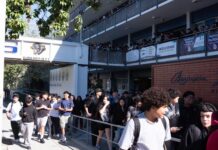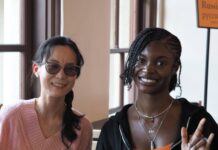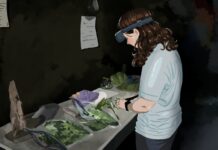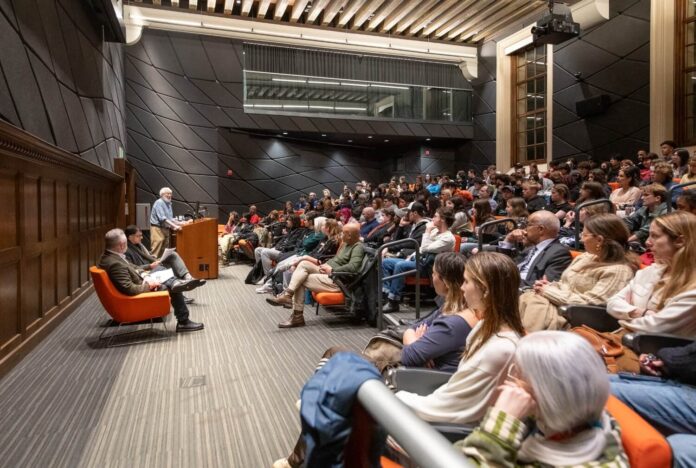The Diplomacy and World Affairs (DWA) and Politics departments hosted a conversation titled “How Do We Talk About Palestine and Israel?” Feb. 6 as part of the “Contextualizing Israel/Palestine Series” of events taking place this semester. About 200 students and faculty members filled up Choi Auditorium, leading many to sit in the aisles on the floor and spread out in the auditorium’s lobby to hear the conversation between the Salam Al-Marayati, president of the Muslim Public Affairs Council, and Daniel Sokatch, chief executive officer of the New Israel Fund, according to E.P. Clapp Distinguished Professor of Politics Peter Dreier.
Dreier was the moderator of the conversation, and said the event was his idea — Drier asked his department, Politics, and DWA to cosponsor it.
“After the occupation of [the Arthur G. Coons administrative building] last semester, I thought it would be important to find ways to educate students and faculty about how to discuss the Israel-Palestine situation in ways that build bridges rather than walls,” Dreier said via email.
Al-Marayati said that he and Sokatch have known each other for 20 years and started an organization called New Ground together which focuses on Muslim-Jewish partnerships. During the event, both Sokatch and Al-Marayati said they agreed with calls for a ceasefire. However, the two speakers disagreed with methods regarding showing support for the Palestinian people.
Dreier said that he spoke with other faculty to discuss possible speakers who have different perspectives but share a common commitment to activism, peace and democracy.
Sokatch began his initial remarks by acknowledging that both Palestinians and Israelis have deep connections to the land.
“Palestinians are the victims of the victimization of the Jews in Europe,” Sokatch said.
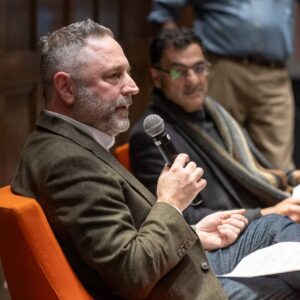
Al-Marayati said that his wife’s family is from Gaza and that so far 60 members of her family have died. Al-Marayati said that once deaths reach a certain number, they sound more like a statistic than a tragedy.
According to Al-Marayati, speaking at college campuses about this issue has a larger importance for him than speaking with politicians.
“America has not exemplified the discourse of the Palestinian issue,” Al-Marayati said.
Sokatch said he dislikes the “both sides” terminology regarding Palestine and Israel.
“The era of dominance of a single narrative of Israel-Palestine is over in this country,” Sokatch said.
Al-Marayti said that a way for Americans to have an impact in this issue is through nonviolent resistance, specifically through the BDS movement (Boycott, Divestment and Sanctions). According to Al-Marayti, if he were a college student now, he would be part of the Students for Justice in Palestine (SJP).
DWA major Matthew Vickers (junior) said he decided to go to the event because he was curious both about what the speakers had to say and what kind of events the departments were putting on as a part of the “Contextualizing Israel/Palestine Series.”
According to Sokatch, the BDS movement should not be criminalized, but as the CEO for the New Israel Fund, he does support progressive civil investments in Israel. He said that some of these investments are in organizations that aid the Palestinian people. Sokatch also said that he does not agree with academic boycotts.
After answering questions posed by Dreier, the speakers listened and responded to questions from the audience. One of the initial questions asked if Sokatch and Al-Marayati agreed that the current situation with Palestine and Israel was a genocide.
“It will be years before the [International Court of Justice] rules on whether or not what is happening in Gaza is genocide,” Sokatch said.
The person who asked the question also stated that the speakers were “equating genocide to religious conflict” by reducing Palestinian identities to two religious identities.
“This is not a religious conflict,” Al-Maryati said. “There has always been a Palestine, and there’s a distinctive Palestinian identity.”
Sokatch said that he agreed with that statement from Al-Marayati. Another question directed towards Sokatch asked if he incorporated colonial history into his ideas about Israel.
“Of course, it was a colonial enterprise,” Sokatch said. “[The British] gave promises to Jews that there’d be a homeland [in Palestine] with the Balfour Declaration. In many respects, we can understand the Palestinians as victims of thousands of years of Jew-hatred in Europe.”
In response to a question regarding when violent disobedience is acceptable in an oppressive government, Al-Marayati said that resistance which is legitimate in international law must never be targeting civilians. Sokatch agreed that targeting civilians, including Palestinians, has to be the red line that must be condemned.
Dreier asked the speakers what a solution is in the upcoming presidential election when so many people disagree with the Biden administration’s support for Israel.
“Because the choice is untenable, in my opinion, you have to do everything you can to push the Biden administration to try to be something that at least resembles a fair broker,” Sokatch said.
According to Sokatch, 85 percent of the citizens of Israel now oppose their own government.
Al-Marayati said that the Biden administration has to stop pretending to grieve over the suffering of Palestinians, and that Biden should step down from the election if he really cared about the Democratic party. According to Al-Marayati, Biden is going to lose Michigan without the Arab and Muslim vote.
“The Democratic Party only wins when all the different groups — ethnic, racial, religious, young and old, come together to support the Democratic Party,” Al-Marayati said.
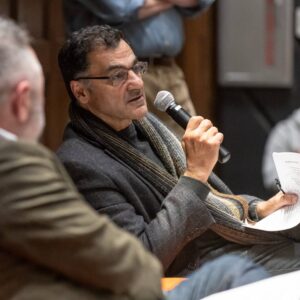
Gianna Nguyen (sophomore) said that overall, the event reinforced her existing opinions about Palestine and Israel. Nguyen said she decided to attend the event after her professor pushed back the start time for her class to accommodate people who wanted to attend.
During the question and answer portion of the session, Nguyen asked the speakers for their advice on steps to take to help people in Gaza despite the sense of “learned helplessness” that is pervading the country.
“I went in without any expectations, just because I didn’t want to have my defenses up,” Nguyen said. “This is a very sensitive issue and I have a very strong stance on it. I did enjoy the back-and-forth between Daniel and Salam, just to see how these two people who have different backgrounds might converse civilly about the genocide in Palestine.”
Nguyen said that she disliked Sokatch’s avoidance of answering questions regarding if he defined the current situation in Palestine as a genocide.
Vickers said he was surprised that the conversation seemed to be mostly about the historical context of the Israel-Palestine situation and that Al-Marayati seemed to be dominating the conversation.
“I thought he was very persuasive,” Vickers said. “It was kind of vulgar — more like a smackdown.”
According to Vickers, the most interesting part of the conversation was when Al-Marayati’s openly criticized Biden and suggested that he should drop out of the race.
Dreier said he was very pleased by the turnout, the substance of the discussion and the enthusiasm of the audience, including the questions asked by speakers.
Sokatch and Al-Marayati are slated to co-teach a course at Occidental in the Fall about Israel-Palestine, most likely cross-listed in the DWA and Politics departments, according to Dreier. The announcement of this course was met with a round of applause by the audience.
Vickers said he did not have a positive reaction to the announcement that Sokatch and Al-Marayati would be teaching a class since neither of them hold doctorates, and the college currently has a class in the History department titled “A History of the Palestine-Israel Question.”
“I think they should have professional historians, professional academics,” Vickers said. “It doesn’t necessarily matter which department, but not just a couple of dudes whose work is centered on organizing.”
Both Sokatch and Al-Marayati have contributed to prominent news publications such as The New York Times and Washington Post. Al-Marayati recently taught a class titled “The Middle East and North Africa in the Forever Wars” in the Critical Theory and Social Justice (CTSJ) department and has spoken at the White House as well as on news outlets such as CNN and MSNBC. Sokatch holds a Juris Doctorate, a Masters degree, and wrote a book titled “Can We Talk About Israel: A Guide for the Curious, Confused, and Conflicted.”
Vickers said that he is planning on going to upcoming events in the “Contextualizing Israel/Palestine Series,” such as the event on Feb. 20 titled “The Cost of Borders” in the Global Forum.
Contact Ava LaLonde at lalonde@oxy.edu
This story was edited at 6:30 pm, Feb.19, to reflect that Dreier was the sole organizer of the event and to add context concerning the backgrounds of Al-Marayati and Sokatch.
![]()







